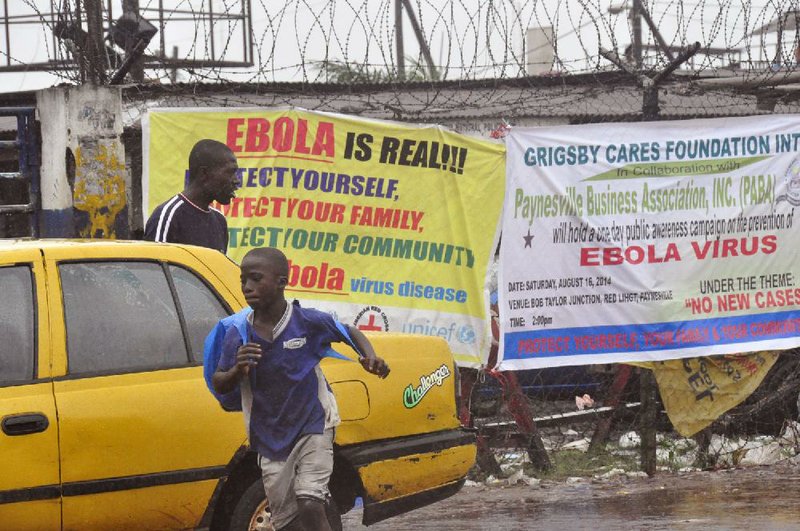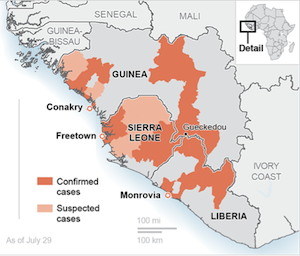MONROVIA, Liberia -- Liberian officials fear Ebola could soon spread through the capital's largest slum after residents raided a quarantine center for suspected patients and took items including bloody sheets and mattresses.
Meanwhile, aid groups in the region have begun pulling doctors and other development workers from the West African countries hit hardest by Ebola, further weakening the region's understaffed health systems and preventing medical experts from locating the origin of the outbreak.
The violence in the West Point slum occurred late Saturday and was led by residents angry that patients were taken to the holding center from other parts of Monrovia, Tolbert Nyenswah, assistant health minister, said Sunday.
As many as 30 patients were staying at the center, and many of them fled at the time of the raid, Nyenswah said. Once they are located, they will be transferred to the Ebola center at Monrovia's largest hospital, he said.
West Point residents went on a "looting spree," stealing items from the clinic that were likely infected, said a senior police official, who insisted on anonymity because he was not authorized to talk to the media. The residents took medical equipment and mattresses and sheets that had bloodstains, he said. Ebola is spread through bodily fluids.
"All between the houses you could see people fleeing with items looted from the patients," the official said, adding that he now feared "the whole of West Point will be infected."
Some of the looted items were visibly stained with blood, excrement and other bodily fluids, said Richard Kieh, who lives in the area.
The incident creates a new challenge for Liberian health officials who were already struggling to contain the outbreak.
Liberian police restored order to the West Point neighborhood Sunday. Located on land between the Montserrado River and the Atlantic Ocean, West Point is home to at least 50,000 people, according to a 2012 survey.
Distrust of government runs high in West Point, with rumors regularly circulating that the government plans to clear the slum out entirely.
Although there had been talk of putting West Point under quarantine should Ebola break out there, Nyenswah said Sunday that no such step has been taken. "West Point is not yet quarantined as being reported," he said.
Ebola has killed 1,145 people in West Africa, including 413 in Liberia, according to the World Health Organization.
In working to ease the influx of infected patients, Doctors Without Borders began accepting patients Sunday at what is intended to be the largest-ever Ebola treatment center, near Monrovia. The center is near two previous units, which have been filled beyond their intended capacity as the number of suspected Ebola patients in the capital increased greatly in recent days.
The new unit, on the grounds of the Eternal Love Winning Africa mission hospital in Paynesville City, is designed to hold 120 patients and can be expanded to accommodate more than 300.
President Ellen Johnson Sirleaf of Liberia, in an interview last week, said she hoped the new unit would relieve the problem of insufficient space.
The rush of people reporting for testing and isolation in the capital has come in part, doctors say, from increased public awareness. Sirleaf has been ubiquitous in the media, informing the public about Ebola and how to protect themselves.
Other countries across Africa are grappling to prevent Ebola's spread with travel restrictions, suspensions of airline flights, public health messages and quarantines.
Nigeria appears to be making progress in containing the disease. The country has 12 confirmed cases of Ebola, all of which stem from direct contact with the Liberian-American man who flew to Nigeria late last month while ill. He infected several health workers before dying.
Since then, three others have died in Nigeria of Ebola, according to figures released over the weekend.
One Nigerian doctor has survived the disease and was sent home Saturday night, and five others confirmed with Ebola have almost fully recovered, Health Minister Onyebuchi Chukwu said in a statement Saturday night.
Aid problems
The departure of many aid groups' workers from Guinea, Liberia and Sierra Leone, the countries hit hardest by the disease, has come while they are facing a grave public health crisis. Liberia, population 4 million, has fewer than 250 doctors left in the entire country, according to the Liberia Medical and Dental Council. Seven doctors there have contracted Ebola, and two of them have died.
"The locals' seeing this mass exodus of expatriates has contributed to the sense that there's an apocalypse happening and they're in it on their own," said Raphael Frankfurter, executive director of the Wellbody Alliance, which provides clinical services in a diamond-mining district of Sierra Leone bordering Guinea, where the outbreak began.
Frankfurter sent his four American volunteers home for fear they might fall ill. They left behind 160 national staff members. "It's certainly not in line with our values, because it's just such a glaring inequality," he said. But "it's a very scary place to get sick right now."
Many African health workers battling Ebola are contracting it themselves. At least 170 workers have gotten the disease, according to the WHO, and more than 80 have died.
Fear is complicating the huge increase in aid that is needed: food for people in areas that have been cordoned off; laboratory supplies to test for the disease; gloves, face masks and gowns to protect health workers; body bags for the dead; bedsheets to replace those that must be burned.
Hundreds of workers for Doctors Without Borders have fought the outbreak since March. The group's president, Dr. Joanne Liu, said there was an acute need for materials as well as for more human resources on the ground -- and not just experts and bureaucrats, but also the kind of person who is ready to "roll up his sleeves."
"What we have to keep in mind is we are facing today the most devastating and biggest Ebola epidemic of the modern times," Liu said. "There is fear, there is a front line, the epidemic is advancing, and there is a collapse of infrastructure."
Ebola's source
An even bigger problem lurks beyond the frenzied efforts to keep people from spreading Ebola: No one knows exactly where the virus comes from or how to stop it from seeding new outbreaks.
Pinpointing its origin has had to wait until they can tame the current.
"First and foremost, get the outbreak under control. Once that piece is resolved, then go back and find what the source is," said Jonathan Towner, a scientist who helped find the bat source of another Ebola-like disease called Marburg. Towner works for the U.S. Centers for Disease Control and Prevention.
Health experts think the initial cases in each outbreak get it from eating or handling infected animals. They think the virus may come from certain bats, and in parts of Africa, bats are considered a delicacy.
But bats may not be the whole story or the creature that spreads it to humans.
The WHO lists chimpanzees, gorillas, monkeys, forest antelope and porcupines as possibly playing a role. Even pig farms may amplify infection because of fruit bats on the farms, the WHO says.
"It's not clear what the animal is. It's going to take a lot of testing," said Dr. Robert Gaynes, an Emory University infectious disease specialist who worked for the CDC for more than 20 years.
Part of the puzzle is how long the virus has been in West Africa. Previous outbreaks have been in the east and central regions of the continent.
The current outbreak began in rural Guinea, and the first suspected first case was a 2-year-old child who died in Gueckedou prefecture in December, researchers wrote in the New England Journal of Medicine in April. They did not speculate on how the child may have become infected.
One or more types of Ebola virus have "probably been there in the mix" for some time but for some reason didn't explode into a widespread epidemic in West Africa until this year, said Stephen Morse, a Columbia University infectious disease expert.
Ebola's jump from animals to people is thought to be rare. Experts say there may be a large degree of bad luck in becoming infected -- in a cave associated with a Marburg outbreak, Towner found the virus in only 3 percent of bats he tested. Even if an animal source is clearly identified and people are warned, "there is always likely to be an occasional exposure -- someone who drives off the highway, in essence," Morse said.
Information for this article was contributed by Jonathan Paye-Layleh, Corinne Chin, Maram Mazen, Mike Stobbe and Marilynn Marchione of The Associated Press and by Sheri Fink of The New York Times.
A Section on 08/18/2014


